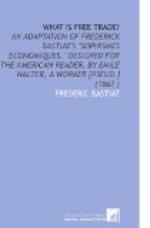Theorists hence go on to found a system upon these individual interests, and say: Wants are riches: Labor is riches: The obstacle to well-being is well-being: To multiply obstacles is to give food to industry.
Then comes the statesman; and as the developing and propagating of obstacles is the developing and propagating of riches, what more natural than that he should bend his efforts to that point? He says, for instance: If we prevent a large importation of iron, we create a difficulty in procuring it. This obstacle severely felt, obliges individuals to pay, in order to relieve themselves from it. A certain number of our citizens, giving themselves up to the combating of this obstacle, will thereby make their fortunes. In proportion, too, as the obstacle is great, and the mineral scarce, inaccessible, and of difficult and distant transportation, in the same proportion will be the number of laborers maintained by the various branches of this industry.
The same reasoning will lead to the proscription of machinery.
Here are men who are at a loss how to dispose of their petroleum. This is an obstacle which other men set about removing for them by the manufacture of casks. It is fortunate, say our statesmen, that this obstacle exists, since it occupies a portion of the labor of the nation, and enriches a certain number of our citizens. But here is presented to us an ingenious machine, which cuts down the oak, squares it, makes it into staves, and, gathering these together, forms them into casks. The obstacle is thus diminished, and with it the fortunes of the coopers. We must prevent this. Let us proscribe the machine!
To sift thoroughly this sophism, it is sufficient to remember that human labor is not an end but a means.
Labor is never without employment. If one obstacle is removed, it seizes another, and mankind is delivered from two obstacles by the same effort which was at first necessary for one. If the labor of coopers could become useless, it must take another direction. To maintain that human labor can end by wanting employment, it would be necessary to prove that mankind will cease to encounter obstacles.
CHAPTER III.
EFFORT—RESULT.
We have seen that between our wants and their gratification many obstacles are interposed. We conquer or weaken these by the employment of our faculties. It may be said, in general terms, that industry is an effort followed by a result.
But by what do we measure our well-being? By our riches? By the result of our effort, or by the effort itself? There exists always a proportion between the effort employed and the result obtained. Does progress consist in the relative increase of the second or of the first term of this proportion—between effort or result?
Both propositions have been sustained, and in political economy opinions are divided between them.




